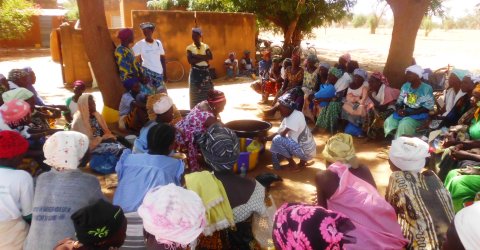
Women’s leadership in Local Water Committees in Burkina Faso
The Burkina Faso National Gender Policy of 2009 notes the existence of age-old gender inequalities in the areas of access to, supply of and management of drinking water. It states that shortcomings in hygiene and sanitation are also harmful in varying degrees to both sexes. In fact the greatest part of the burden of providing water for domestic needs is borne by women or girls. Thus, much energy and time are devoted to this activity in rural and peri-urban areas, to the detriment of productive or capacity-building activities. When on the other hand this activity takes on an aspect of trade, it becomes more masculinised.
In spite of this, statistics from services for the advancement of women show that in 2013 women's entrepreneurship was a driver for economic growth and job creation, contributing about 70 per cent of GDP. The women of Burkina Faso work mostly in the processing and marketing of products from agriculture, forestry, fishing and craft-making.
In a note published in 2011, the International Union for the Conservation of Nature (IUCN) showed that the establishment of Local Water Committees (LWC) improves the representation of women in organisations working for the management of the drinking water supply and sanitation, and increases the account taken of their specific problems and needs in the choice of hydraulic structures and the technologies that accompany them. The LWC is a basic component in the governance of water resources and illustrates the institutional achievement at local level of the application of the fundamental principles for the Integrated Water Resources Management, including the principle that women are at the heart of the process of the supply, management and preservation of water.
Since 2013 the "Consolidation of Local Environmental Governance" (COGEL) project, with the support of the Austrian Cooperation (Austrian Development Agency - ADA), has been supporting decentralised territorial communities of the Central North region of Burkina Faso and LWCsin the area. The LWCs, thanks to the dynamism of women, have contributed significantly to the establishment of a Local Land Charter (LLC), a locally enacted consensual regulation for the sound management of Lake Dem Ramsar Site; and to the designation of three new Ramsar Sites: Tougouri Dam Lake, Yalgo Dam Lake and the Nakanbé-Mané Basin.
Among the conditions for the successful implementation of LLCs is the securing by women of the unanimous adoption of a non-discriminatory provision on equitable and sustainable access to the water resources of lakes Dem (Ramsar Site) and Sian. Being in direct contact with nature and the main suppliers to households of forest resources and non-timber forest products, women's and young people's groups form an integral part of inter-village follow-up and monitoring committees for the Local Land Charters.
By Paul Ouédraogo (Senior Advisor for Africa, Ramsar Convention Secretariat) & Bobodo Blaise Sawadogo (Coordinator of Consolidation of Local Environmental Governance project)